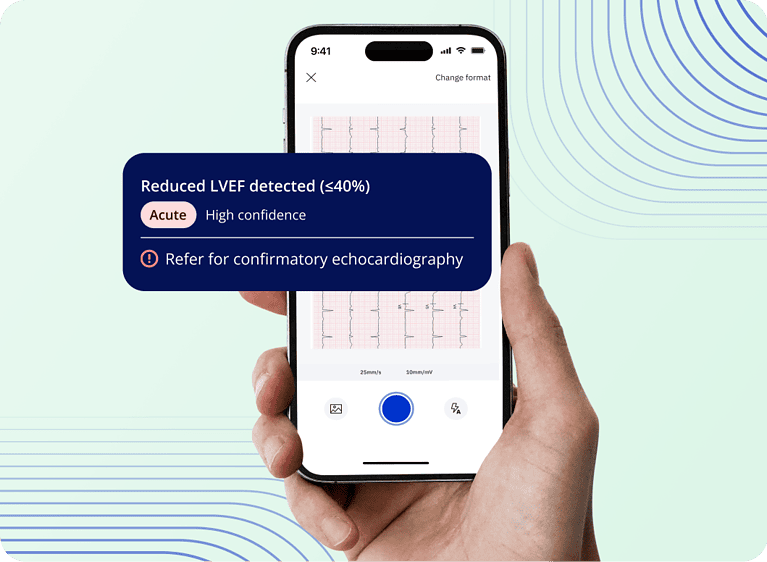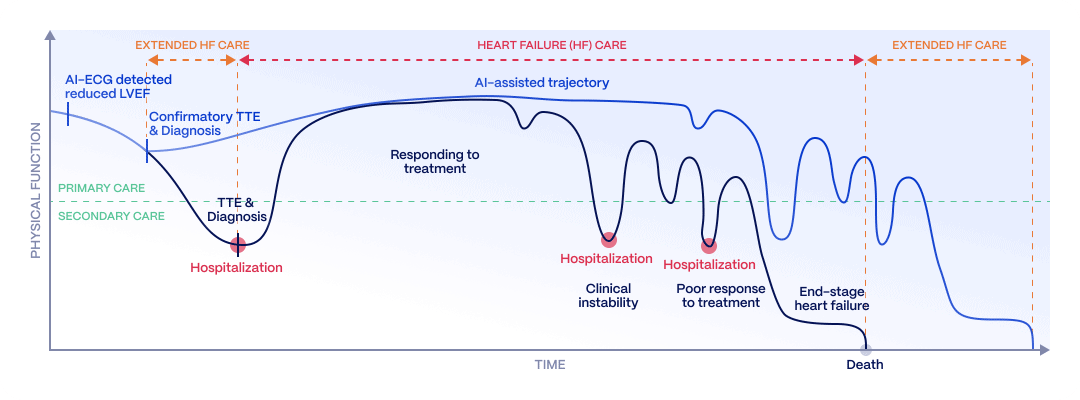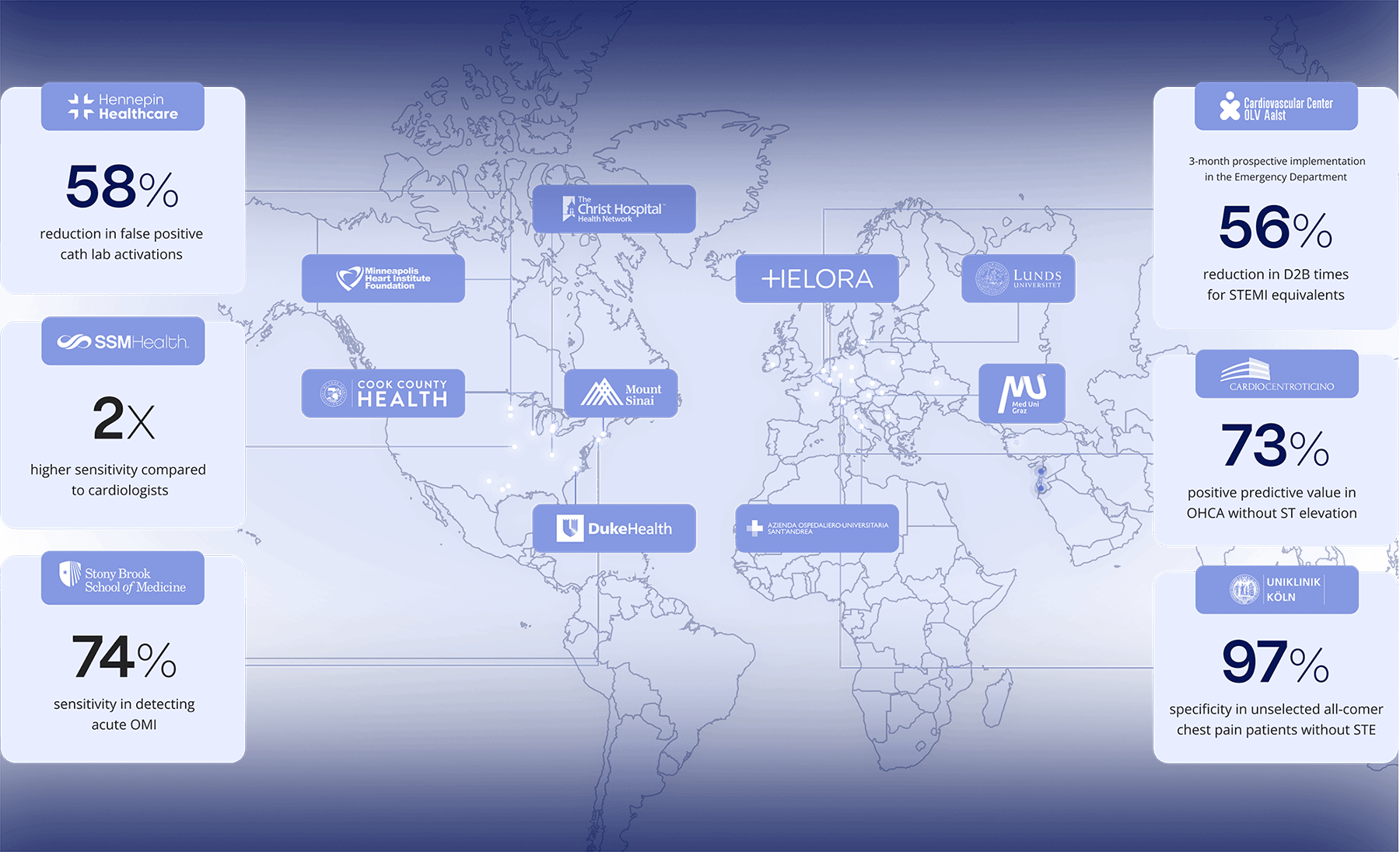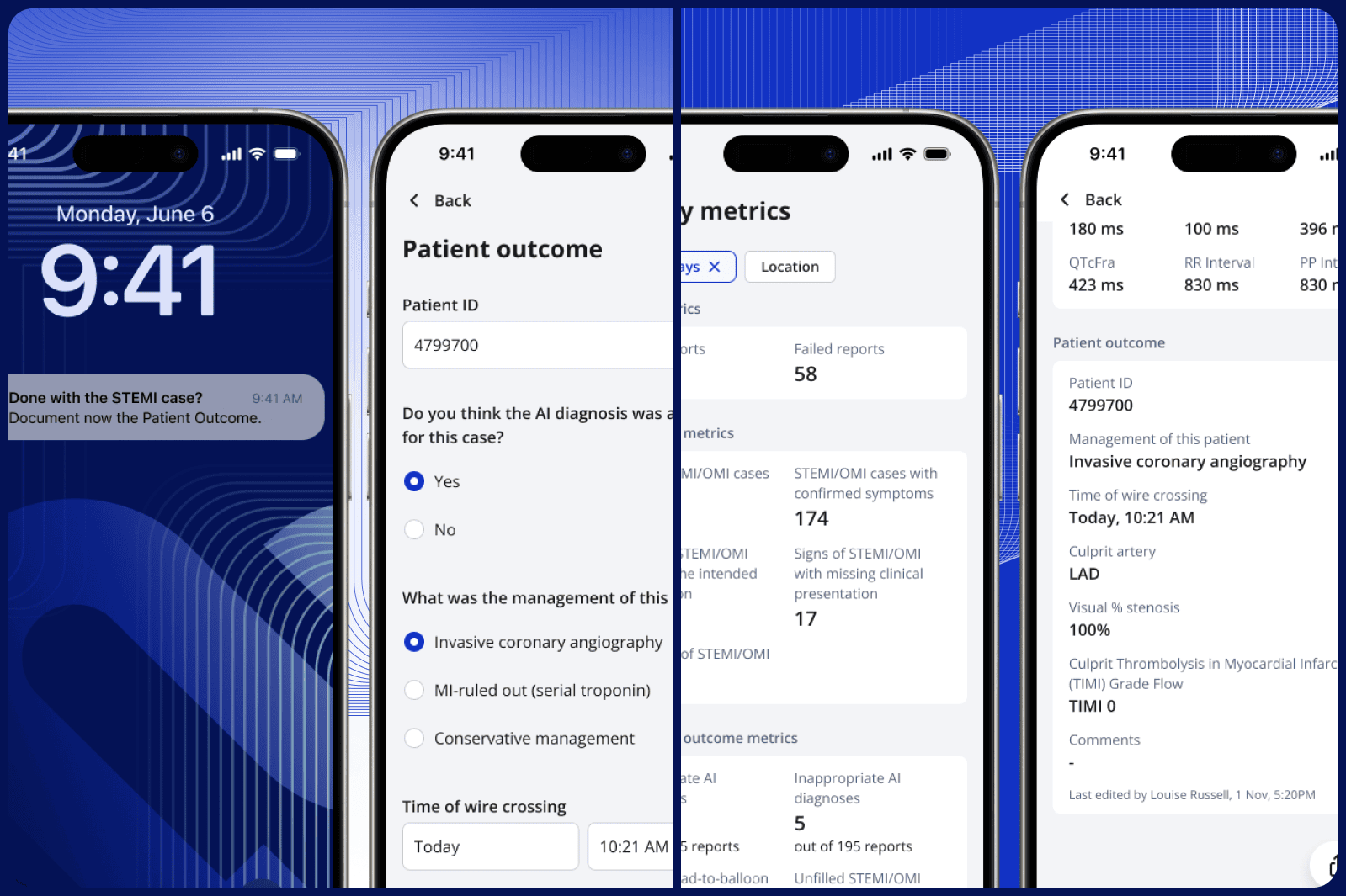Early Detection of Reduced LVEF on ECG with AI
PMcardio offers a rapid and accurate assessment of left ventricular (LV) systolic function. Utilizing advanced AI technology, it enables detection of reduced LVEF from a 12-lead ECG7.

*Performance metrics from internal validation studies.
Understanding the Challenge
Nonspecific Symptoms

Lack of Awareness

Limited Echo Availability
Heart Failure (HF) Overview
- Affects 1-2% of adults.
- Over 10% prevalence in individuals aged 70 years or older (EU).
- Expected to rise due to an aging population and improved survival rates (US)5.
- Affects 2.2-3.4% of the population (EU)3.
HF Hospitalizations:
- 1.2 million hospitalizations in 2017 (US)5.
- Costs projected to increase from $30.7 billion in 2012 to $69.8 billion by 2030 (US)5.
- 1-year mortality rate: 20%.
- 5-year mortality rate: 53%-67%.
The Role of Patient Screening
Routine screening using the AI-augmented 12-lead ECG allows for swift assessment of LV function. This helps to accurately identify patients needing confirmatory echocardiography7.

PMcardio Implementation
PMcardio offers a rapid and accurate assessment of left ventricular (LV) systolic function. Utilizing advanced AI technology, it enables detection of reduced LVEF from a 12-lead ECG7.
AI-Driven LVEF Assessment
The AI algorithm can assess LV systolic function on the ECG, a capability beyond many physicians' skills.
Enhancing Efficiency
Analyzing the ECG via AI algorithm significantly reduces the time required to assess LV function, enabling faster clinical decision-making and timely referral.
Improving Accessibility
We are committed to making advanced cardiac diagnostics accessible to a wider range of healthcare providers, ensuring more patients benefit from accurate LV systolic function assessment.
Impact of PMcardio
Impact of
Timely Diagnosis
Enables earlier screening, helps differentiate underlying causes of symptoms, and allows for early lifestyle modifications and treatment2.
Appropriate Treatment
Ensures more patients receive appropriate treatment based on guideline recommendations, increasing positive clinical outcomes3.
Reduced Hospitalizations
Early diagnosis and adequate treatment reduce acute exacerbations and complications of HF, minimizing hospitalizations3.
Cost Savings
Minimizes the need for advanced interventions and preventable hospitalizations, reducing overall healthcare expenditures.
Improved Patient Pathway
By identifying reduced LV systolic function early, we can create an improved patient pathway, ultimately reducing HF hospitalizations.
Global clinical evaluation of our AI-powered ECG interpretation platform PMcardio
Join more than 30 hospitals leveraging AI to streamline cardiac care and improve patient outcomes.

Be at the Forefront of Cardiac Care: Join the AI-driven LVEF Detection Revolution Today!
References:
- Lang RM, Badano LP, Mor-Avi V, et al. Recommendations for cardiac chamber quantification by echocardiography in adults: an update from the American Society of Echocardiography and the European Association of Cardiovascular Imaging. Eur Heart J Cardiovasc Imaging. 2015;16(3):233-70. https://doi.org/10.1093/ehjci/jev014.
- Marwick TH, Gillebert TC, Aurigemma G, et al. Recommendations on the use of echocardiography in adult hypertension: a report from the European Association of Cardiovascular Imaging (EACVI) and the American Society of Echocardiography (ASE). Eur Heart J Cardiovasc Imaging. 2015;16(6):577-605. https://doi.org/10.1093/ehjci/jev076.
- SOLVD Investigators, Yusuf S, Pitt B, Davis CE, Hood WB Jr, Cohn JN. Effect of enalapril on mortality and the development of heart failure in asymptomatic patients with reduced left ventricular ejection fractions. N Engl J Med. 1992 Nov 19;327(10):685-91.
- Ledwidge M, Gallagher J, Conlon C, Tallon E, O’Connell E, Dawkins I, Watson C, O’Hanlon R, Bermingham M, Patle A, Barry M, McDonald K. Natriuretic peptide–based screening and collaborative care for heart failure: the STOP-HF randomized trial. JAMA. 2013 Jul 3;310(1):66-74.
- Dunlay SM, Roger VL, Redfield MM. Epidemiology of heart failure with preserved ejection fraction. Nat Rev Cardiol. 2017 Oct;14(10):591-602. doi: 10.1038/nrcardio.2017.65. PMID: 28518150.
- Benjamin EJ, Levy D, Vasan RS, D’Agostino RB, Belanger AJ, Wolf PA, et al. Impact of heart failure on mortality rates in the Framingham Heart Study population: an update. JAMA. 1999; 281(18):1728-34. doi:10.1001/jama.281.18.1728.
- Demolder A, Herman R, Vavrik B, Martonak M, Boza V, Herman M, Palus T, Kresnakova V, Bahyl J, Iring A, Hatala R, Bartunek J, Vanderheyden M, Heggermont W, Penicka M. A smartphone-based AI model to detect left ventricular systolic dysfunction on 12-lead ECG. Abstract. Eur Heart J. In press.






